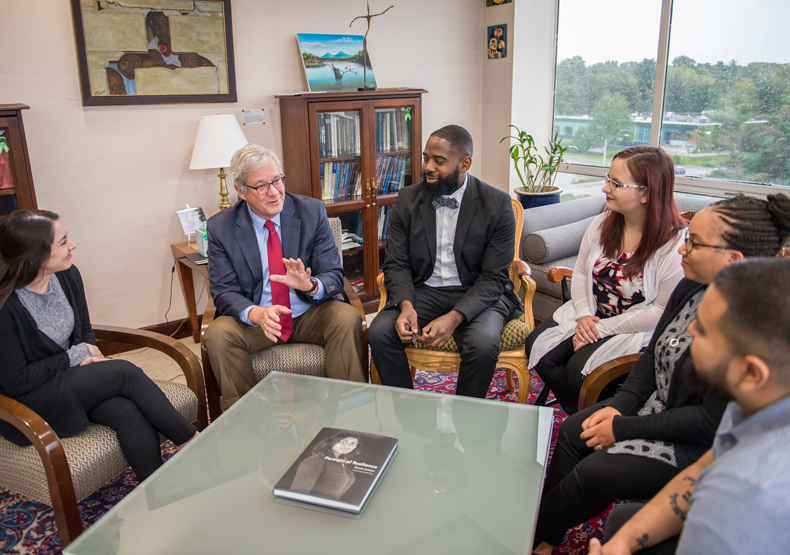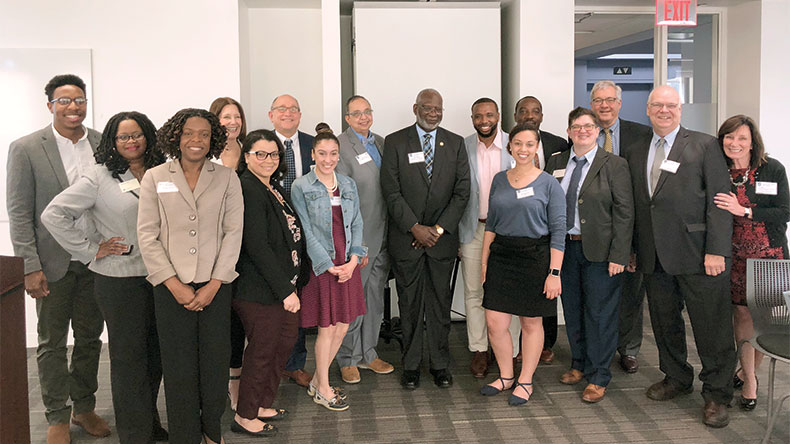Our most pressing and passionate goal: Building a workforce to serve the underserved

From left to right: Emily Crain, Nicholas Covino, PsyD, Antoine Salvador, PsyD, Samantha Higgins, Regina Banks and Christopher Rosales.
By the year 2025 the behavioral health workforce in the United States will be short 250,000 workers. It is a looming gap that consumes William James College President Nicholas Covino. It’s the reason he has collaborated with school leaders, department chairs and professors to create the Behavioral Health Workforce Development Program Initiative, develop a bachelor’s degree program, and forge partnerships with corporate, civic, and philanthropic thought leaders. William James College has become the unstoppable force meeting the immoveable object that is the depleted behavioral health workforce.
Physicists will tell you that for a force to be truly unstoppable it must have infinite energy. The team at William James does. Through tireless persuasion, collaboration and inspiration, the College is moving the workforce development ship full speed ahead.
We are blessed to have very patient students. They are endlessly willing to share their backgrounds, consult and teach us about their experiences. They help us get it right.
—Nicholas Covino, PsyD, president, William James College
When asked why he commits so much time and energy to this one issue, Covino answers simply and succinctly; “Because most people ignore it.” What keeps him up at night are the shortages of trained professionals available to work in psychotherapy, substance use treatment, and children’s programs. People simply do not have access to the help they need.
He calls it a “Hydra” of a problem with many different heads; access to services, economics, training and awareness. There is a dire need for more mental health staff in emergency rooms where people in crisis either languish or are sent home. Wages are low. Universities aren’t training the numbers of professionals needed in the field and the behavioral health profession itself fails to acknowledge the workforce crisis. “There is an unknowing that needs to be confronted,” says Covino.
To gather more insight and information on what needs to be done to build a workforce of color and diversity, the College convened a conference on Disparities in Mental Health Care. Fifty-one people attended the conference; a distinguished audience of advocates, managed care executives, ministers, physicians, corporate CEOs, and college faculty. Many of them see people in crisis every day, but don’t have the training or resources with which to help.
Former US Surgeon General Dr. David Satcher was the keynote speaker. “I was a victim, but I became a confronter,” said Satcher in his address. “It’s time to confront the issue of behavioral health disparities head on with a workforce to meet the challenge.”
Other thought leaders at the conference led panel discussions. Panelists included Dr. Margarita Alegria, chief of the Disparities Research Unit at Massachusetts General Hospital, Dr. Esteban Cardemil, professor of psychology at Clark University and Dr. Natalie Cort, director of the Black Mental Health Academy at William James.
Together, those in attendance explored questions like, “How do we develop a broad and effective behavioral workforce of color?” and “What should the College pay attention to as it expands its role?”
Harvard CAP (Community Action Partners) helped to publicize the forum. They provided consultation to William James College in the efforts to provide career pathways to help lower level workers stay in the behavioral health field and advance. Another is MassBay Community College, a partner who offers certifications to those who don’t have a degree but want to advance in their field.

Forum Participants (from left to right): Darryl Sweeper, Jr., Natalie A. Cort, PhD, Gemima St. Louis, PhD, Jill Betz Bloom, PhD, Joselyn Rondon, Stanley J. Berman, PhD, Tania Jimenez, Shani Dowd, LCSW, Former US Surgeon General Dr. David Satcher, S. Kwame Dance, Sade Callwood, Marc Abelard, MEd, Nilda Laboy, PsyD, Nicholas Covino, PsyD, James Roosevelt Jr, and Margaret Hannah, MEd.
When it comes to workforce development, Covino wants action and meaningful change and doesn’t hesitate to talk about it frankly. “We have been ignoring this problem for a long time,” he says. “Those of us in the behavioral health profession worry about whether our practices are full and what our colleagues are doing. We need to realize there are people in desperate need of help from professionals with shared cultures.”
According to Covino, 90 percent of behavioral health professionals are white. Fifty percent of Hispanics never return to their mental health provider because of a lack of shared culture, language and life experiences. Veterans who need treatment for post-traumatic stress disorder (PTSD) may not return after two or three visits.
“It’s time we created a source of opportunity for diverse peoples,” says Covino. “William
James can, and will, partner with people of color so that together we can do the right
thing for this country. It’s time we learned each
other’s language and how to negotiate our own differences and diversity.” Schools
like William James can train the numbers of professionals that are needed to meet
the need.
At William James education is a two-way street as students educate the professors just as much as the professors educate them.
“We have very patient students who are endlessly willing to share their backgrounds and teach us about their experiences,” says Covino. The result is a holistic learning experience that creates new understandings of diverse life experiences.
There is hope, says Covino. “I know that if we build it, they will come. We will teach an increasing number of diverse people that behavioral health positions are good jobs that will pay better and allow them to do good works.”
- Tags:
- Around Campus
Topics/Tags
Follow William James College
Media Contact
- Katie O'Hare
- Senior Director of Marketing
- katie_ohare@williamjames.edu
- 617-564-9389
